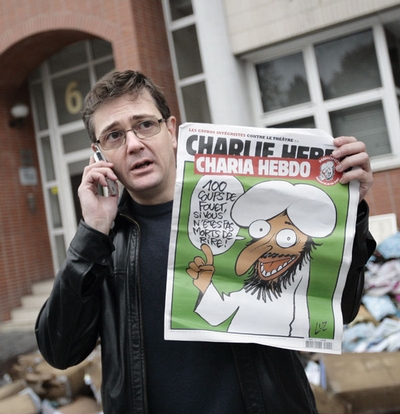
Less than two months later, this attack is already all but forgotten. We have become accustomed to the religious curtailment of free speech. Hardly a week passes without the forced closure of an art exhibition or a theatre performances, death threats and violent attacks against publishers, authors or cartoonists.
But free societies should never grow accustomed to the reduction of the liberty to criticise or ridicule religion. Here, two effects of the bombing of Charlie Hebdo raise special concern. One relates to the Danish daily newspaper Jyllands-Posten which, in 2005, published the 12 Muhammad cartoons that were taken as a pretext for the international “cartoon crisis”. Back then Charlie Hebdo reprinted the cartoons, adding their own home-made drawings, and were subsequently charged with “publicly abusing” Muslims, a charge of which they were acquitted in 2008. Now, with Charlie Hebdo in need of support, you might have expected a grateful Jyllands-Posten to return the favour. Yet no Charlie cartoons appeared in the Danish daily, and in a strange and shameful editorial, the editors tried to explain. They correctly argued that to give in to violence only produces more violence, but then claimed, incredibly, that to refrain from reprinting the Hebdo images in some sense constituted a renewal of their commitment to free speech! The editorial also called for understanding of the plight of the newspaper, which over the last five years has had to transform its offices into a security compound resembling Fort Knox. Editor-in-chief Jørn Mikkelsen appeared on Danish television in an obvious state of discomfort, sweating and squirming as he struggled to provide a coherent defence of his paper’s position. It seems clear that the primary motivation was fear, but this was something Mikkelson would not admit, nor would he say whether it was the newspaper’s board or somebody else who twisted his arm.
Another worrying factor is the behaviour of the Anglo-American press. Following the bombing there were two different photos doing the rounds: one of the gutted Charlie offices, and one of the same scene with a journalist holding up a copy of the “Sharia Hebdo” issue in front of the ruins, the front-page joke easily readable. A quick, unscientific internet investigation suggests that major continental newspapers used the photo with the magazine cover visible, in some cases supplemented with further reprinting of drawings from the issue. Most if not all French papers, of course, but also titles such as El Pais in Spain, Repubblica in Italy and Die Welt in Germany. But English and American papers, including the Guardian, New York Times, Washington Post, San Francisco Chronicle and Chicago Tribune, all chose the photo without the magazine. This continues the pattern already established by the Danish cartoons. Here lies a strange reversal. In the US free speech has a much firmer legal footing than in Europe.
Compare the stout defence of free speech enshrined in the famous First Amendment with the EU’s shameful requirement that member states pass their own “hate-speech” legislation. Yet Europeans (with the notable exception of the British) were given the chance to see the “offending” images by their news media, and were able to make up their own minds about them and understand the full context of the bombing. Americans and Brits were not. In this, the Anglo-American media are effectively giving in to the terrorists.
It is time for the international news media to face up to their responsibilities. Islamism is not the only version of extreme religious right-wing thought keen to attack free speech. Radical Christians and Hindus are eager to follow suit, not to mention neo-fascists like Anders Breivik in Norway. Leading newspapers do not have to take the lead in religious satire, but the least they can do is report accurately, and fully, on the achievements and troubles of other, more courageous, publishers like Charlie Hebdo. We celebrate, as we should, the role of the press as the fourth estate. It’s time for them to act like it, and to keep the open society open.

